Last Updated on by Catherine Tobsing
Captivity is a relative term. I’m not relegated to my home but I still have to pay rent, go to work, pay taxes and perform all those duties that enable me to be a good neighbor and good citizen of the world.
If captivity is all that you know, is it really captivity? We have eight budgies, all rescues. We don’t have the background on any of them but we’ve kept them flighted, and recently started leaving the door open but most don’t ever leave the cage.
They have 3 full spectrum lamps on top on top of their cage on a timer which goes on at 8:30 every morning and turns off at 8:30 every evening.
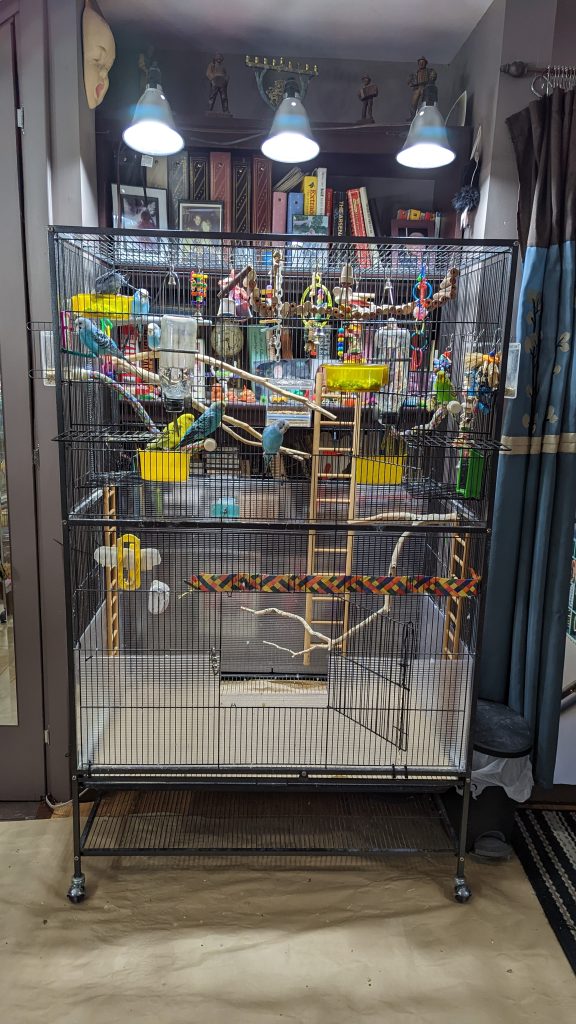
When the light comes on in the morning I’m usually up and will uncover the cage to find that their day has already started.
Although we have three males and five females, Jam, one of the females seems to be an organizer of the flock.
When I watch them in their cage from my desk which is about 8 feet away she’s always giving some sort of direction.
She’s also best at what I call “helicoptering”. The cage is wide enough at 30 inches for them to do small flights but Jam just starts flapping keeping herself floating in the middle of the cage while shouting out orders like a drill sergeant.
“Toast, stay away I’m not interested in your shenanigans today I don’t want to have sex so go do something else”.
“Eggs, go over to the back cage wall and keep trying to tug on that toy until you can rip it off”.
“Bacon, you’re looking better today but I want you to just stay there and watch all of us”.
“I’m going to land on the millet holder so I can be the first one to chow down on our millet breakfast“.
And so it goes. I call them my “singing flowers” they are always making fun little noises and really don’t seem to notice whatever noise we have on be it music or television or just conversation.
For reasons at many levels we just haven’t taken the time to start from the beginning, i.e. clipping their wings, flight training, and socializing them but they are doing fine together.
It’s been more than a few years now they’ve existed as a flock in their own little caged universe and I’ve interacted with a lot of birds – the budgies seem happy.
They always have a project that they’re working on be it destroying a wooden shelf, ripping the newest toy apart, or taking turns enjoying a lettuce and water bath.
So perhaps at some point in the future, we will pluck them out of the cage, clip their wings and begin to bring them into the family but until then they seem pretty happy to me.
A few years ago, we had a solitary female Senegal, Peaches, who we rescued about a year and a half ago.
She spent 22 hours a day in a cage for more than seven years with a caregiver bringing her out an hour in the morning and an hour in the evening.
She was in a rescue with birds of all sizes but didn’t care for the larger birds so she spent her time isolated in a smaller cage in the room with smaller birds.
She had her wings clipped before she ever fledged and never experienced flight.
For the year and a half in our home, she was never in her cage when we were there unless it was birdie bedtime.
Peaches our Senegal would sit on the headrest of my office chair. When Catherine and I start to chat Peaches joined in with unintelligible sounds and clearly felt she was part of the (conversational) flock.
She enjoyed her cage during the day and would begin to bob her head if she likes a particular song we have on the stereo.
The thing that made her unhappy is my not being there. She tolerated my wife Catherine but Catherine brought her no joy.
I am working with Peaches, training her to fly to me under various circumstances.
If I came home and opened the door and she didn’t come out I left her there although I could tell by her body language she really wanted me to reach in and scratch the top of her head which I usually did.
I’d take a seat at my desk with a high back office chair and usually within a few minutes she would fly over easily landing on the headrest.
From there she would make it down one of my arms to land on my main desk or side desk where I had all sorts of activities for her to engage in.
Flinging business cards, foraging in junk mail. Looking for treats hidden among all these paper things one will find on a desk.
It was only when she started headbutting the other bird’s reflection on the monitor of the desk would I shoo her away.
She then learned to take refuge on top of the monitor which was quite boring, eventually flying back to her cage, having a snack returning to my desk – ad repeat.
In the mornings she was free to follow me around the apartment. Popcorn a rescued cockatiel that we had for three and half years (having died of cancer) was great at flying from room to room knowing where to land in each environment.
Peaches was not so good at landing, so if I was going into a room where she was not certain about where to land, I’d bring her in with me and let her fly the 12 or 24 inches or so to the play stand that we had on the kitchen table.
If not she would fly around and land on top of the refrigerator or the decorative baskets we had on top of the cabinets making it harder to get her down without stressing her out – I usually would get a step stool and come to her.
I felt bad for the few hours she spent in the cage alone at home in the winter when it was too cold to transport her back and forth with us to work but I think all the out-of-the-cage time that she got made up for that and overall I think she too was a happy bird.
In conclusion
Many write about providing foraging and enrichment “things” to help replicate activities birds would be doing in the wild. It’s also said that parrots spend 40% of their time seeking food and 60% of their time trying not to be food (in the wild).
This begs the question, with 99 million years of evolutionary instinctual expectations, does captivity without the worry of predatory attack make for a less stressed bird?
A case can be made that captivity is rewarding.
Does the failure to acknowledge equatorial light cycles, simply replace the “no more hawks to fear” stress point?
Circling back to the original question the easiest way to know the happiness level of your captive bird is to put on your holistic captive bird viewing goggles and look at every aspect of your bird’s life.
Written by Mitch Rezman
Approved by Catherine Tobsing
Your Zygodactly Footnote
Author Profile
Latest entries
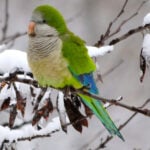 The Traveling BirdJune 26, 2025Can You Name 5 Parrot Species That Are Living Wild in the USA?
The Traveling BirdJune 26, 2025Can You Name 5 Parrot Species That Are Living Wild in the USA?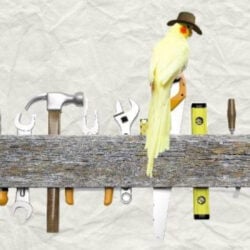 Bird BehaviorJune 26, 2025How is it Parrots Are Problem Solvers Social Animals and Even Use Tools?
Bird BehaviorJune 26, 2025How is it Parrots Are Problem Solvers Social Animals and Even Use Tools?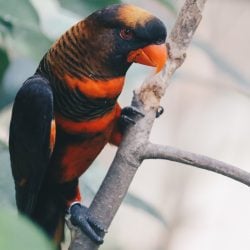 Bird & Parrot AnatomyJune 25, 2025How a Tiny Chemical Modification Makes Parrots Nature’s Living Paintings
Bird & Parrot AnatomyJune 25, 2025How a Tiny Chemical Modification Makes Parrots Nature’s Living Paintings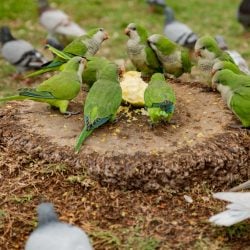 PigeonsJune 20, 2025How Do Parrots Thrive in Cities Outside Their Native Habitats?
PigeonsJune 20, 2025How Do Parrots Thrive in Cities Outside Their Native Habitats?

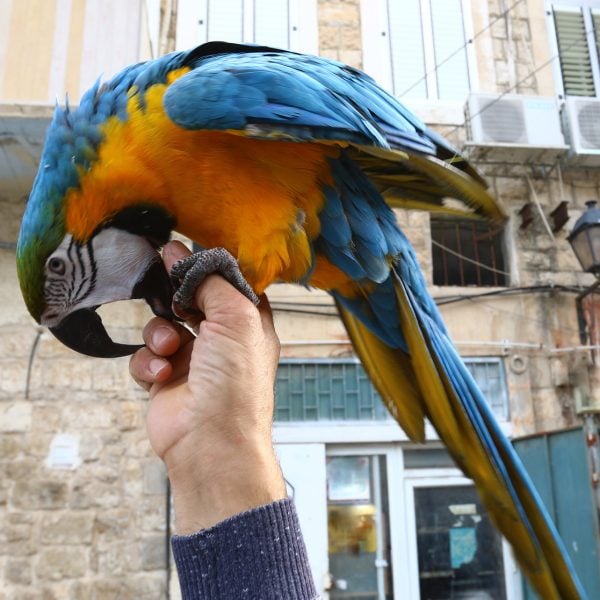



[email protected]
9 Oct 2022Peaches is so beautiful! She must really love you, Mitch.
Mitch Rezman
9 Oct 2022She did but only me so we had to rehome her to a single human home